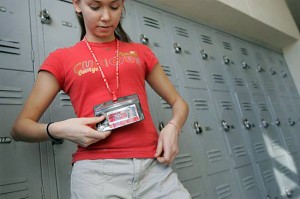This week a school district in San Antonio in Texas USA approved a program for tagging students while they are in school. The students will have to wear a small card at all times while in the school so that their positions can be constantly monitored by the authorities.
The RFID tags will be provided free of charge but if they lose or destroy it the student will have to pay $15 for a new one.
The schools that are implementing the project on a trial basis state that they want to “harness the power of the technology to make schools safer, know where our students are all the time in school, and increase revenues,”
‘Increase revenues’ is the part that catches my eye the most here, why might the project increase revenue? The answer is in attendance, the schools receive state funding based upon attendance and how many special needs children take the school buses, in this case based upon the related Medicare payments.
The schools hope to make about $1.7 million a year, and with the cost of setting up the scheme about half a million and about $135 thousand a year to run they are ‘quids in’ as we say in Manchester.
Rather unsurprisingly some of the parents of the children that attend the 2 pilot schools have expressed some reservations. Privacy issues due to the invasive nature of the idea have been raised, and some argue that kidnapping and related horrors could even be made easier if someone managed to gain access to the system and the real time information that it produced.
This news reminds me of an article that I wrote a few years ago on the Bassetti Foundation website regarding spying technology and later its proposed uses in schools in Italy. Here is a mention on a blog related to the matter in question. As this article suggests, the problem of mobile phone use in schools and particularly for cheating in tests and exams is apparently rife, so one school bought a military jammer that blocks the signal making the phone system non operational.
This event also caused a few raised eyebrows (to say the least) with people claiming the right to contact their children in emergency situations. Problems of overspill and local disturbances were also raised but the school argued that the system was necessary in order to uphold the school rules and quality and reliability of its exam process. The law has now changed so the system is no longer in use but the will and means was there.
Coaxing and encouragement while at school and the notion of doing the right thing seem to be out of the door then!
As a note I was a teacher in an Italian secondary school for 11 years myself, and I don’t think this approach will work. Kids are smart.
